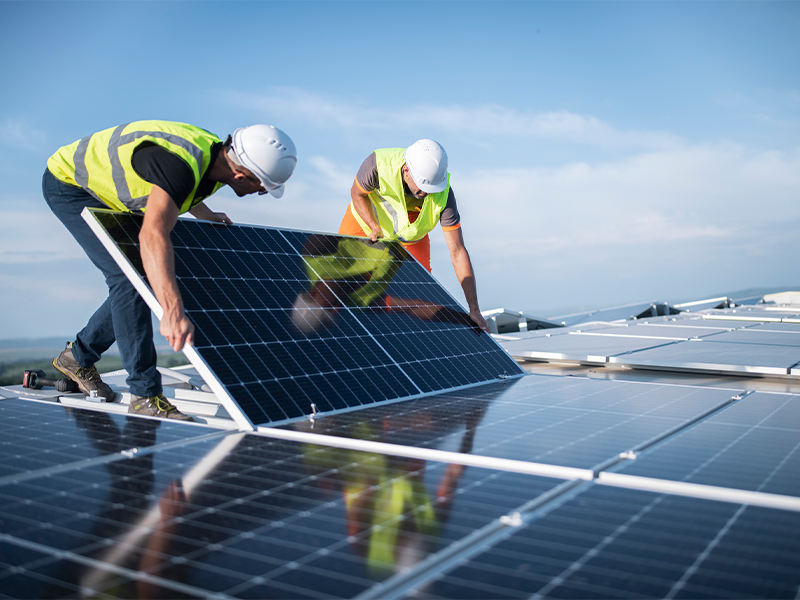Exactly How Solar Power Can Assist You Conserve Cash and Minimize Your Carbon Footprint
The assimilation of solar power into your power profile presents an engaging opportunity for both economic savings and ecological stewardship. By utilizing the sunlight's power, house owners can significantly decrease their regular monthly utility costs while also safeguarding against the changability of future power costs. The shift to solar adds to a marked decline in carbon emissions, straightening personal finance with more comprehensive ecological goals. As different government incentives end up being available, the question develops: just how can one properly browse the first financial investments and ongoing advantages of solar innovation to maximize both economic and ecological gains?
Understanding Solar Power Cost Savings
While the transition to solar power usually entails an initial investment, recognizing solar power financial savings is critical for homeowners and companies alike. Solar energy systems can considerably lower electrical energy expenses by taking advantage of the sun's power, converting into substantial long-term monetary benefits. By producing their very own power, customers reduce reliance on grid power, which is subject to varying rates. These financial savings can accumulate in time, frequently leading to a fast roi.
Moreover, solar energy systems might qualify for numerous monetary incentives, consisting of tax obligation credit scores and refunds, further enhancing their cost-effectiveness. The accessibility of net metering allows users to offer excess energy back to the grid, developing an extra income stream. These factors add to the overall cost savings connected with solar power.

Along with direct financial savings, solar energy supplies the included advantage of increasing home value. Houses furnished with solar panels are typically much more attractive to buyers, as they assure reduced energy expenses - Simply Solar Illinois. Comprehending these components is vital for anyone considering solar energy, as it highlights not just the potential financial gains, however also the wider ecological and financial benefits of taking on renewable resource services
Initial Expenses vs. Long-Term Conveniences
When reviewing solar power, it is necessary to evaluate the initial prices versus the long-term benefits. The in advance investment for solar panels, setup, and relevant devices can be substantial, frequently ranging from $15,000 to $30,000, depending on the system size and home energy demands. This preliminary expense may prevent some house owners; nonetheless, it is critical to consider the prospective cost savings over time.
When set up, solar power systems can substantially decrease or perhaps get rid of monthly electrical energy costs, bring about substantial long-lasting economic advantages. Researches show that home owners can save anywhere from $10,000 to $30,000 over the life-span of their solar system, usually 25 years. Additionally, numerous states provide incentives, tax credit reports, and discounts that can counter first expenses, making solar a lot more obtainable.

Reducing Your Carbon Footprint
Reducing your carbon footprint is a vital factor to consider in today's eco mindful society, and embracing solar power is just one of one of the most reliable approaches to achieve this objective. Solar energy is a clean, renewable source that substantially lessens reliance on fossil gas, which are significant contributors to greenhouse gas exhausts.

Additionally, the extensive fostering of solar modern technology urges the growth of environment-friendly tasks and supports advancements in power storage and performance. The even more people and companies invest in solar power, the higher the cumulative reduction in carbon emissions, cultivating a cleaner atmosphere for future generations.
Government Motivations and Refunds
Taking on solar energy not just profits the atmosphere yet can additionally cause substantial financial cost savings, particularly with the accessibility of federal government motivations and discounts. Different federal, state, and neighborhood programs are top article designed to motivate home owners and businesses to buy solar power systems, making the transition more affordable.
One of the most popular incentives is the Federal Financial Investment Tax Credit (ITC), which allows solar system owners to deduct a significant percentage of the installment expenses from their federal taxes. This motivation has actually been essential in minimizing the upfront expenditures connected with solar power systems. In addition, lots of states supply their own tax credit ratings, gives, and discounts that can further enhance savings.
Moreover, some local federal governments supply property tax exceptions for solar installments, making sure that property owners do not face raised real estate tax as a result of their renewable resource investments. Utility firms might likewise use motivations, including web metering and feed-in tolls, which enable solar power customers to sell excess power back to the grid.
Selecting the Right Solar System
Picking the appropriate solar system is important for making the most of energy effectiveness and economic advantages. The decision depends upon numerous elements, consisting of power demands, budget plan, and offered room. House owners ought to start by evaluating their electricity consumption to establish the system dimension needed for optimal performance.
Following, think about the different kinds of solar modern from this source technologies offered. Simply Solar Illinois. Solar (PV) panels are the most common, transforming sunshine directly right into power, while solar thermal systems concentrate on heating water. Each kind has unique advantages depending on specific demands
Spending plan considerations are also paramount. Initial installation expenses can differ considerably, so it is very important to contrast quotes from numerous carriers and explore funding alternatives. Federal government rewards and discounts can even more decrease the economic problem, making planetary systems a lot more available.
Verdict
In recap, solar power presents a practical remedy for attaining considerable price financial savings while at the same time reducing carbon emissions. The preliminary financial investment, though substantial, yields significant lasting monetary benefits, with prospective financial savings varying from $10,000 to $30,000 over 25 years. In addition, the environmental benefits of solar power contribute to lasting methods crucial for combating climate modification. Government motivations boost the feasibility of solar modern technology adoption, urging a shift towards a cleaner, extra financially efficient energy source.